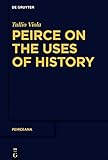Peirce on the Uses of History / Tullio Viola.
Material type: TextSeries: Peirceana ; 4Publisher: Berlin ; Boston : De Gruyter, [2020]Copyright date: ©2020Description: 1 online resource (XI, 250 p.)Content type:
TextSeries: Peirceana ; 4Publisher: Berlin ; Boston : De Gruyter, [2020]Copyright date: ©2020Description: 1 online resource (XI, 250 p.)Content type: - 9783110649499
- 9783110649611
- 9783110651560
- 100
- online - DeGruyter
- Issued also in print.
| Item type | Current library | Call number | URL | Status | Notes | Barcode | |
|---|---|---|---|---|---|---|---|
 eBook
eBook
|
Biblioteca "Angelicum" Pont. Univ. S.Tommaso d'Aquino Nuvola online | online - DeGruyter (Browse shelf(Opens below)) | Online access | Not for loan (Accesso limitato) | Accesso per gli utenti autorizzati / Access for authorized users | (dgr)9783110651560 |
Browsing Biblioteca "Angelicum" Pont. Univ. S.Tommaso d'Aquino shelves, Shelving location: Nuvola online Close shelf browser (Hides shelf browser)

|

|

|

|

|

|

|
||
| online - DeGruyter Das Strafrecht des Herzogtums Braunschweig im 19. Jahrhundert bis zum Reichsstrafgesetzbuch / | online - DeGruyter Sand als metaphorisches Modell für Virtualität / | online - DeGruyter Internationales Jahrbuch des Deutschen Idealismus / International Yearbook of German Idealism . 14/2016, Der deutsche Idealismus und die Rationalisten / German Idealism and the Rationalists / | online - DeGruyter Peirce on the Uses of History / | online - DeGruyter Wissenschaft / | online - DeGruyter Technik und Symbolik vormoderner Wahlverfahren / | online - DeGruyter The Institutional Foundations of the Digital Economy in the 21st Century / |
Frontmatter -- Acknowledgments -- Abbreviations -- Contents -- Introduction -- Part I -- 1. The Making of a Polymath -- 2. Not a Mere Wonder Book -- Part II -- 3. Historicity as Process -- 4. Autonomy and the Value of Experience -- 5. Sociality, Dialogue, Disagreement -- Part III -- 6. Peirce the Historian -- 7. The Logic of Historical Inquiry -- Conclusion: The Legacy of a Realist -- Bibliography -- Index of names -- Index of terms
restricted access online access with authorization star
http://purl.org/coar/access_right/c_16ec
The present book is the first to undertake a systematic study of Peirce’s conception of historical knowledge and of its value for philosophy. It does so by both reconstructing in detail Peirce’s arguments and giving a detailed account of the many ways in which history becomes an object of explicit reflection in his writings. The book’s leading idea may be stated as follows: Peirce manages to put together an exceptionally compelling argument about history’s bearing on philosophy not so much because he derives it from a well-articulated and polished conception of the relation between the two disciplines; but on the contrary, because he holds on to this relation while intuiting that it can easily turn into a conflict. This potential conflict acts therefore as a spur to put forth an unusually profound and multi-faceted analysis of what it means for philosophy to rely on historical arguments. Peirce looks at history as a way to render philosophical investigations more detailed, more concrete and more sensitive to the infinite and unforeseeable nuances that characterize human experience. In this way, he provides us with an exceptionally valuable contribution to a question that has remained gravely under-theorized in contemporary debates.
Issued also in print.
Mode of access: Internet via World Wide Web.
In English.
Description based on online resource; title from PDF title page (publisher's Web site, viewed 28. Feb 2023)


